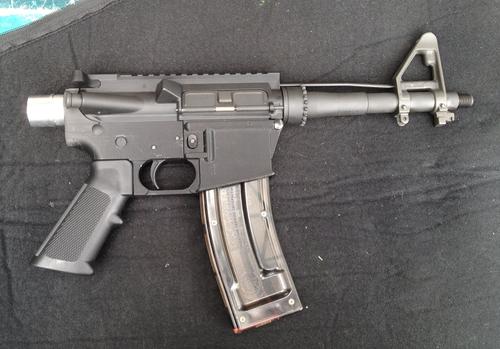
Have Blue's 3D-printed converted AR-15.
(Source: Defense Distributed)
Posted on 12/14/2012 7:24:22 PM PST by null and void
At-home 3D printing is on the rise, and what was once just a lofty promise is now a reality. More and more hobbyists are acquiring affordable printers, such as the Makerbot Replicator 2 and the RapMan Universal 3D (single/dual head) printer, to manufacture just about everything from toys to working clocks.
Some hobbyists have used these printers for fast-prototyping items that are controversial -- or even deadly. It comes as no surprise that some would attempt to replicate weapons systems (or at least parts of them) in an effort to create a fully functional gun. It's not exactly clear who was the first to fabricate a firearm using a 3D printer, but one example that has garnered global attention is "Have Blue," who designed an AR-15 lower receiver (converted to fire .22 ammunition), using a CAD file in the SolidWorks file format that is openly available from CNC Gunsmithing.

After a few modifications to the original file, he set to work fabricating the receiver using around $30 of ABS filament fed through his Stratasys printer. After prototyping a small-scale model, he fabricated the full-size receiver and used it to fire 200 rounds without catastrophic failure. The proof of concept of manufacturing a 3D-printed weapon was a complete success. Now the door is open for others to try their hand at the home weapons manufacturing business.
A group of hobbyists (most of them college students) have banded together to form a company known as Defense Distributed to expand on the 3D-printed weapons systems and provide open-source software to anyone who wants it. Defense Distributed began its quest with the Wiki Weapon Project, which aims to provide all the necessary CAD software for manufacturing plastic firearms using any 3D printer. The group expanded on Have Blue's AR-15 to prove the concept of building weapons with a printer. However, instead of testing Have Blue's .22 conversion build, the group went ahead with an AR-15 conversion in 5.7x28FN, which has more firepower than a .22 but provides less pressure than the standard .223 round.
The group printed the lower receiver using Objet ABS-like filament piped through a Connex 3D printer. The printed rifle fired six shots before breaking. Apparently, the receiver's threads couldn't handle the pressure and snapped at the buffer-tube connection. The group is now looking for funding and a federal firearms license to get its project off the ground.
The problems with 3D-printed firearms aren't limited to catastrophic failure. (It takes only one bullet to kill.) There is also the issue of legality. No federal laws address manufacturing weapons with 3D printers, so anyone owning a printer could make a weapon -- even if they're not allowed to own one. The ATF considers the rifle's lower receiver as the firearm; anyone can purchase the upper receiver, barrel, etc.
The 1988 Undetectable Firearms Act prohibits the manufacturing or possession of guns that can't be picked up by airport metal detectors. This creates a loophole for hobbyists. Firearms typically require metal parts (barrel, springs, bolt, etc.) to function, and those parts can be detected. However, some companies don't want to take any chances. Defense Distributed's first attempt at funding in September through Indiegogo ended in disaster; Indiegogo froze DD's account and sent the $20,000 it raised back to the backers. In October, Stratasys terminated the group's 3D printer lease and seized the equipment from a member's home.
Like it or not, the seed of printing weapons has been planted, and the idea is sure to gain momentum through hobbyists in the near future -- until federal laws are enacted to gain control over the issue. It's only a matter of time before a printed weapon is used in a crime. Then all hell will break loose.
This entire article is largely ‘breathless hype’ - folks have been making their own AKM receivers for years, and the technology is a lot more capable (the resulting firearms use the original military cartridges), a lot more simple (basically folded sheet metal with a few spot welds), AND a lot less expensive, than 3-D printers spitting out synthetic fibers. As JRandomFreeper so astutely observed, there are already many laws on the books covering the manufacture of firearms, whether in your garage, computer room, or elsewhere...


ON EVERY LEVEL
Congrats on your 1000th Thread!
I’m old school. Sticking to my old fashioned, bolt action Italian made Carcano, a family heirloom. It was manufactured in 1937, saw action in Greece, still fires-—AND-— I still have all my fingers. What more could I ask for ?
:)
during WW II wasn’t there something made that literally used a bed spring?
Disclaimer: Opinions posted on Free Republic are those of the individual posters and do not necessarily represent the opinion of Free Republic or its management. All materials posted herein are protected by copyright law and the exemption for fair use of copyrighted works.